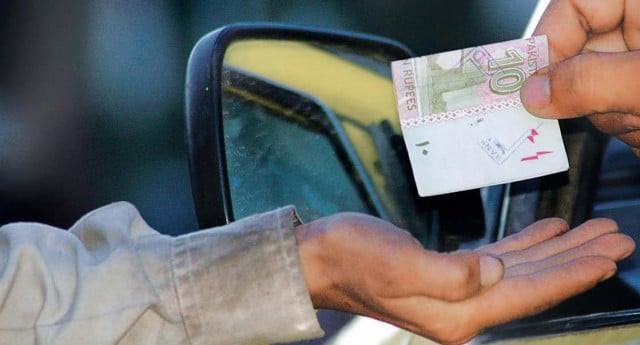Public nuisance: City to move beggars from streets to shelters
Two shelters being built for the needy, 'pros' to be put behind bars.

The city government is planning to launch a crackdown against professional beggars next month, once it completes two rehabilitation centres.
The city government is planning to launch a crackdown against professional beggars next month, once it completes two rehabilitation centres, The Express Tribune has learnt.
The city government will aim to send the truly destitute to the shelters and those who employ children as beggars behind bars, said District Coordination Officer Naseem Sadiq.
“For many people, this is a profession rather than something they are forced to do as they have no choice,” he said. “The professionals cannot be allowed a free hand to bug motorists. But we will provide food and shelter to the needy ones.”
He said that the city police and the Child Protection Bureau would assist in the crackdown on beggars. The bureau is to prepare accommodation for 50 children in the first phase of the campaign and has pledged to take in 250 in total.
The city government is currently getting a 32-room building in Raiwind renovated so it can be used as a rehabilitation centre. Each room would house three people. The second shelter will consist of a 12-room house, also in Raiwind, where vagrants will be able to get vocational skills. The work is to be completed in two weeks.
Former DCO Noorul Amin Mengal had ordered the preparation of an action plan against vagrants and their dependents. The current administration has adopted the same plan, which three NGOs were persuaded to assist. Edhi Homes has pledged to accommodate 100 male beggars and Balqees Edhi Homes has pledged to accommodate 100 female beggars. The Subhani Foundation is to accommodate 250 male and female beggars. Help Line has pledged to arrange for food for the residents of these welfare homes.
PR campaign
Sadiq said that the city government would first run an awareness campaign for two weeks. In the first week, professional beggars would be urged to leave of their own accord or face punishment for being a public nuisance. In the second week, members of the public would be urged not to give any money to beggars. The campaign would be led by NGOs, he added.
The DCO said that most of the children engaged in beggary were employed by adults. He said that a city government team was conducting a survey to identify such adults or groups who employed child beggars. These would be the first to be targeted in the crackdown and would be sent to jail, he added. Children who were begging purely out of need would be sent to the Child Protection Bureau.
Past campaigns by the local government and traffic police to stop begging on the streets and at traffic junctions have largely failed. Officials in the city government admitted in private that it would be difficult to eradicate the practice. One official said that in past campaigns, some beggars had cut themselves with knives or razor blades and blamed them on the police or town officials in order to gain media sympathy.
On the streets
Motorists at junctions on Gulberg’s Main Boulevard, Wahdat Road and Canal Bank Road are often besieged by beggars.
Aman Sheikh, a resident of Defence, said that he found it difficult to ignore kids who came up to his car at an intersection and offered to clean it for Rs10 or 20. “They start knocking on your window and ask for money. If you get annoyed and give them some money just to go away, other beggars will practically swarm your car asking for money,” he said.
Bilal*, 11, offers to clean car windscreens at a set of traffic lights on Main Boulevard. Asked why he would start cleaning before getting the driver’s consent, he said: “Because that way I wouldn’t make any money. No one wants to get their car windows cleaned.”
Bilal said that he had a difficult job that required standing under the blazing sun all day. He said his uncle had convinced his father to send him to work here instead of at a workshop, as this paid more. He said he made an average of Rs200 a day. His uncle selected his location each day and then collected his earnings before he went home for the night. Bilal himself gets Rs200 a month from his father.
A beggar who identified himself as Waheed Shah aged 60 at Canal Bank Road said he had four daughters and no son and he had exhausted the help of friends and family in getting financial support. “They won’t give me a single penny anymore. This is all I can do,” he said.
Shah said that he had three spots for begging. He was often forced to move, he said, by groups who sought ‘rent’ for the spots. He said he had never agreed to pay for the spots so he could not say how much they charged.
*Name changed to protect identity
Published in The Express Tribune, August 27th, 2013.



















COMMENTS
Comments are moderated and generally will be posted if they are on-topic and not abusive.
For more information, please see our Comments FAQ